By Ramesh Kebbehundi
You can trace the journey of a thread — Khadi or the Fabric of Freedom — and at the same time wear clothes made out of it at the ongoing State-level Khadi Utsav, an exhibition-cum-sale organised by Karnataka State Khadi and Village Industries Board at J.K. Grounds in city.
The mega display of Ballari Denim Jeans, Gond tribal medicine, Aminagada Karadantu, Ilkal sarees, pure cotton wears, Kashmiri shawls, West Bengal mats and a host of products from Khadi and Village Industries Commission (KVIC) are pulling crowds to over 95 stalls. The expo is on till Nov. 29 from 10 am to 9 pm.
Of the 95 stalls, over 20 stalls are from Jammu & Kashmir Gramodyog Khadi and woollen silk units. Cottage industries from Haryana, West Bengal, Rajasthan and Tamil Nadu have also set up their attractive kiosks.
The Khadi Utsav offers the best opportunity for people to buy hand-woven authentic silk, Ilkal saree, cotton Khadi wears, Khadi silk shirts and Dhoti, all kinds of woollen, cotton blankets, jubbas, kurtas, shirts, trousers including the latest Modi Jacket and Modi Kurtas.
Other than clothes, there are outlets selling Ayurvedic and herbal medicine, footwear, mats, artefacts and traditional snacks.
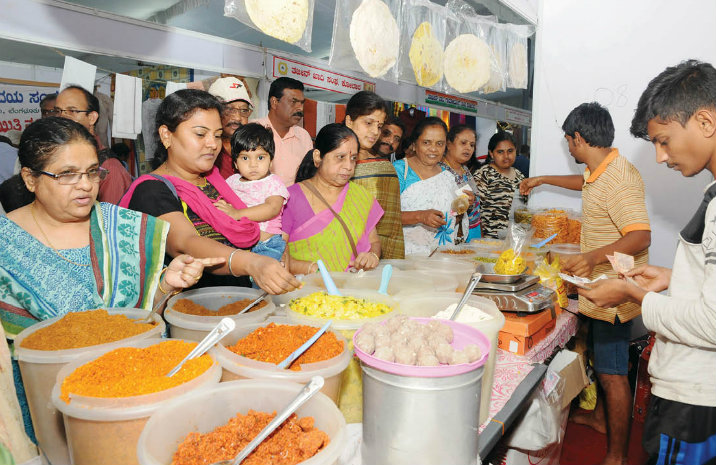
Ilkal sarees
The famous Ilkal sarees, handmade kasuthi sarees by Sharada Handicraft of Uppin Bettageri (Dharwad) is the other attraction. Sharada V. Shinagari said her stall is attracting a large number of women who love Ilkal and kasuthi embroidery sarees.
“Kasuthi embroidery reflects strong traditional designs like palanquins, elephants and creeping lotuses. The pallus of the Ilkal saree have designs of temple towers indicating their lasting influence. Most of the sarees are usually nine yards. Youngsters like wearing a blouse carrying Kasuthi designs on top of their jeans”, she said.
People can also buy cotton, Khadi, Khadi silk sarees from traditional weavers of Rajasthan, West Bengal, J&K, Haryana and other States. Kiosks set up by Chikkaballapura-based Nazneen Silk Khadi Industries Association and Seema Resham Khadi Industries Association are attracting women. These shops have silk sarees ranging from Rs. 3,000 to Rs. 16,000.
Units from Jammu & Kashmir have kept special woollen clothes, shawls, dry fruits and dates. Kashmiri clothes and materials are available for sale from Rs. 500 to Rs. 1.20 lakh.
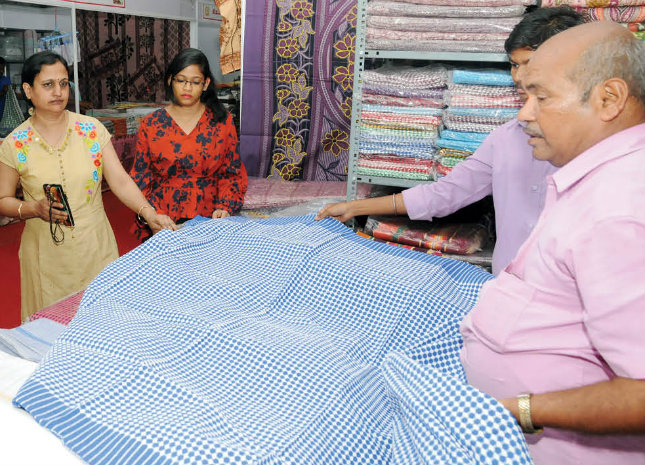
Rajagond Tribal Medicine…
One of the star attractions at Khadi Utsav is the expo of traditional healing medicines. Jai Seva Ayurvedic, Jadiuti Rajagond Colony, Harihar taluk of Davanagere and Dhanvanthri Perfect Ayurvedic Treatment of Bidar are selling medicines for many health problems.
These community shop owners, who are practicing traditional healing practices from time immemorial, have set up kiosks displaying several roots, shrubs, leaves, etc., that act as a source of cure to several ailments.
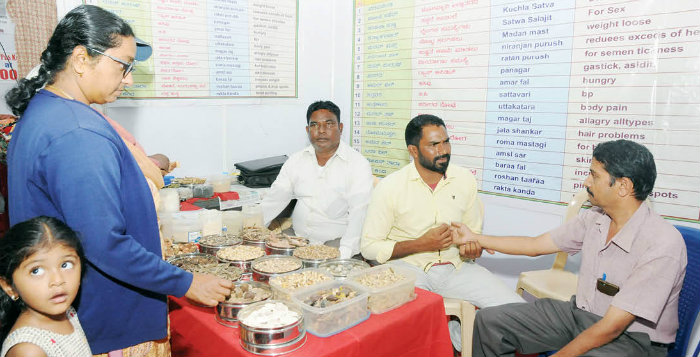
These traditional healers are Rajagondas, a tribal community. About 130 Rajagond families are settled at Bellodi village and surroundings at Harihar taluk. People from Bijapur (Vijayapura), Ballari, Davanagere, Chitradurga and Belagavi apart from neighbouring Maharashtra, Telangana and Andhra visit the Rajagond Colony to avail treatment.
Speaking to Star of Mysore, Asaram of Rajagond Colony shared his experiences of naturally curing tribal healing methods. He said they have traditional medicines and natural cure for piles, jaundice, blood pressure, joint pains, asthma, wheezing, fractures, cold and cough. They have several oils and powders made out of roots and leaves that help in body heat reduction, hair growth, face glow, etc.
They learnt these traditional practices from their elders and that knowledge has passed on from generations. Asaram said that people from his community collect herbs, shrubs and roots from the forests of Srishaila, Belagavi, Bidar, Ballari and Western Ghats which have a rich deposit of medicinal plants.
On a passing note, he said that the community was facing an uphill task these days to find and collect the herbs and shrubs following the harassment meted out to them by the Forest Department staff who are preventing their entry into forests.
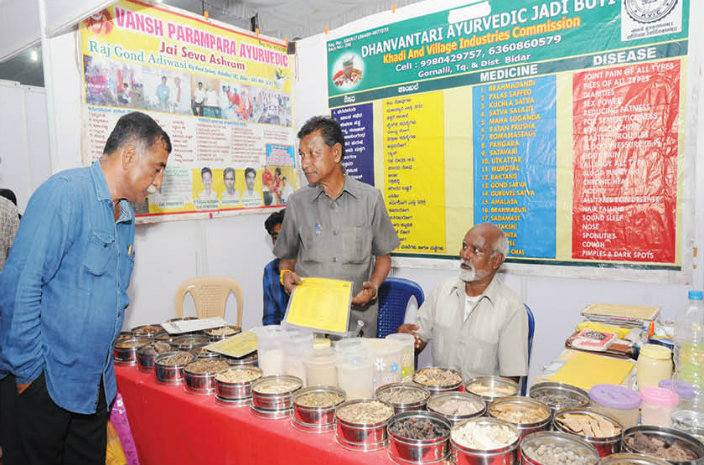
These traditional healers say that they have juices to cure jaundice, eye strains, joint pains, migraine, low haemoglobin levels, cancer, asthma, tuberculosis, weakness and blood pressure.“I used to go to forest with my parents and grandparents during my childhood. I used to study plants and herbs like Chitrak, Kali haldi, Jata Shankhari, Brahmi Buti, Safed Muesli and others,” he said.
He said that he has medicines like Brahamadandi, Satvari, Rakthkand, Gond Satva, Maha Suganda and Tulsi etc. that cures different diseases like diabetes, bronchitis, allergies, hair fall, acidity and chronic disorders.
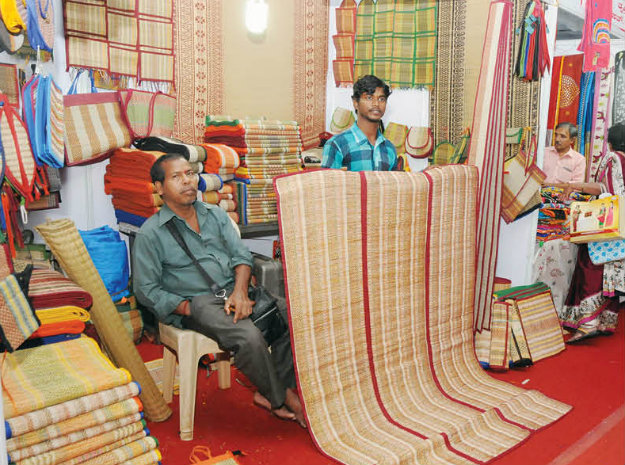
Aminagada Karadantu
Visitors can savour and purchase different varieties of cottage industry products from North Karnataka such as chakkuli, muruku, kodubale, khara and other sweets. Among the snacks sold here, Aminagada Karadantu is a crowd-puller.
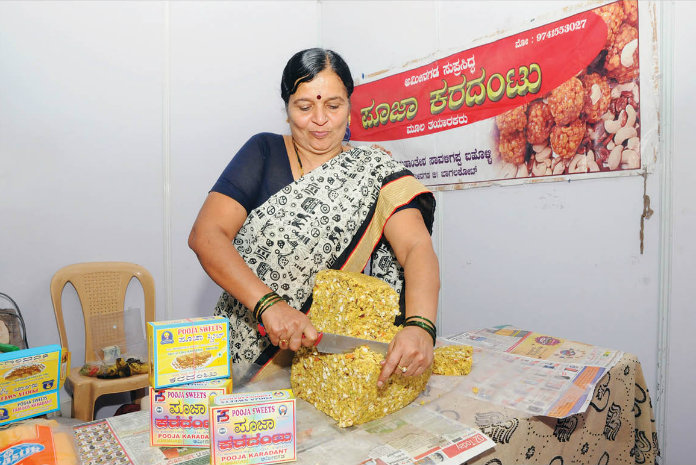
Aminagada near Gokak in Belagavi is famous for Karadantu. The word Karadantu has its roots in Kannada, meaning “fried and edible gum.” It is prepared from edible gum mixed with dry fruits and has a chewy texture. Other ingredients in this yummy sweet are fried Bengal gram flour, jaggery and seeds of “Ballataka.” Known for its nutritional benefits, it is consumed by athletes and pregnant women.



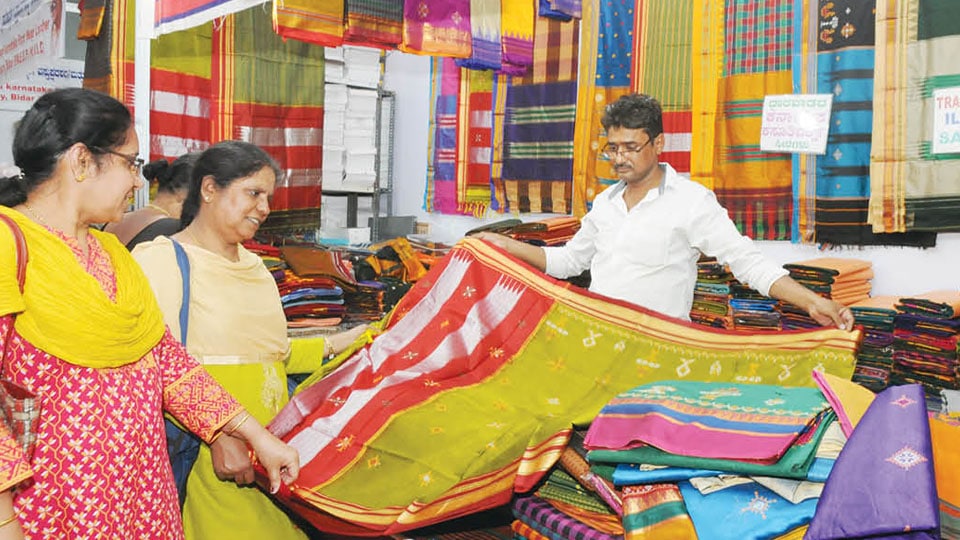
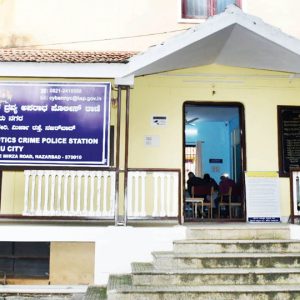

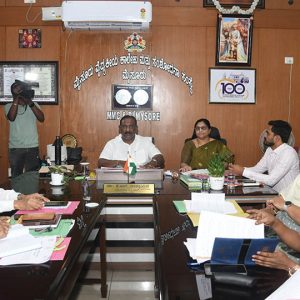
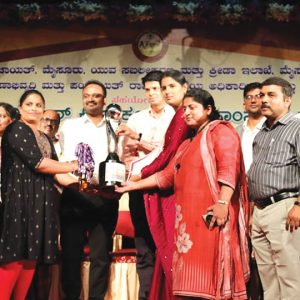
Recent Comments